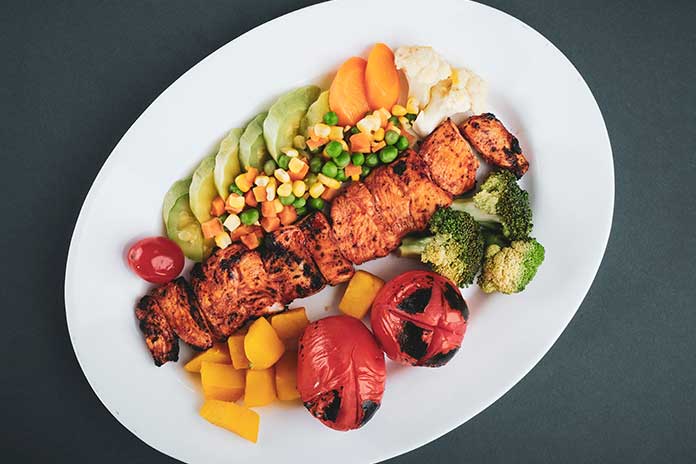We have always heard that having a balanced diet is important for a healthy lifestyle. But how do you establish what is a balanced diet?
A balanced diet is defined as a diet that offers, in the same meal, at least one food from each food group, providing the body with the nutrients it needs. Without proper nutrition, our body is more prone to fatigue, poor performance, diseases, and infections, so creating good eating habits is essential.
Table of Contents
The Importance Of A Balanced Diet
To have a healthy life, it is important to incorporate the habit of maintaining a balanced diet since childhood. Several studies have already shown that children with poor eating habits are prone to growth problems and low academic performance.
In addition, bad eating habits can persist for the rest of their lives, bringing greater problems in the medium and long term, such as diseases like hypertension and diabetes.
A study published by the Center for Science in the Public Interest in the United States found that four of the leading causes of death in the country (heart disease, stroke, diabetes, and cancer) are directly influenced by diet.
6 First Steps To A Balanced Diet
Now that we understand the concept of a balanced diet, let’s get to know the first 6 steps to maintaining a good diet in our daily lives:
Balancing Food Groups
key to a balanced diet is to include adequate portions of each food group in the diet daily.
According to a study carried out by the WHO (World Health Organization), to achieve a balanced diet, it is necessary to consume a wide variety of foods that make up the following food groups: vegetables, fruits, vegetables, nuts, and cereals.
According to the WHO, for a healthy and balanced diet, adults should consume at least 400 grams of fruits and vegetables a day, equivalent to 5 servings. The intake of free sugars should represent less than 10% of the total caloric intake, which is equivalent to 50 g or 12 teaspoons, ideally half this amount.
In addition, ideally, less than 30% of daily caloric intake should come from fat, with saturated fats representing less than 10% of total caloric intake and a maximum of 1% for trans fats.
Also, the US Department of Agriculture recommends consuming lean protein and dairy.
Also Read: Lose Weight With Healthy Diet
Opt For Complex Carbohydrates
Carbohydrates can appear in the diet, as they work as an energy source for our body. The UK’s National Health Service recommends that foods high in starch (a type of carbohydrate), such as whole grains, make up over ⅓ of all that we eat because they have a lot of fiber.
When we talk about carbohydrates, it is always good to keep in mind that this food group is divided into two main types: simple carbohydrates and complex carbohydrates.
The main difference between these two types of carbohydrates is the time of absorption by our body. While simple carbohydrates, such as white rice, potatoes, and sugar, generate energy more quickly, complex carbohydrates, such as brown rice, sweet potatoes, and yams, release energy more slowly, as they are composed mostly of fiber, they are more difficult to digest, providing satiety for longer.
Consume Good Fats
According to the NHS, a certain amount of fat is essential for our diet, as it is necessary both for the absorption of vitamins, as a source and reserve of energy, and being important to help maintain body temperature.
However, it is always necessary to opt for healthy fats, which are monounsaturated and polyunsaturated, found, for example, in foods such as nuts, avocado, and cold-water fish such as salmon and tuna. Other sources of healthy fats include flaxseed, olive oil, chia, and dark chocolate.
You have to be careful with calories, as such foods tend to be caloric, and don’t overdo it, as excess fat can easily be stored in the body, causing weight gain and health problems.
Limit Consumption Of Empty Calories
Empty calories are those from sugar and solid fats. These calories provide little or no nutritional value to our body and should be avoided to achieve a balanced diet.
In the same vein, the NHS, the UK health body, recommends eating less saturated fat and less sugar in the diet, as too much-saturated fat can increase blood cholesterol levels and regular consumption of high-sugar foods and drinks. Increase the risk of developing obesity and tooth decay.
How Many Calories Do You Eat Daily?
A calorie is the amount of energy that a food provides to the body to carry out its vital functions. The number of calories in a food is a measure that represents the amount of energy stored in it. Our body uses the calories from meals to walk, think, breathe and fulfill other vital functions.
That is, an insufficient number of calories in the diet impairs the functioning of our body. At the same time, excessive consumption of calories is associated with weight gain. Thus, we need to know the ideal amount of calories that we should consume in a day so that our diet is also balanced in this aspect.
Count On The Help Of A Nutritionist
All this can seem a little complicated for those who are not used to having a balanced diet or have a busy routine that there is no time to take care of the diet.
In these cases, counting on the help of a nutritionist can make a difference. The professional will help you find a balanced diet that provides all the nutrients and calories your body needs, and that is not too complicated to follow.
Also Read: What Does A Healthy Diet Look Like?


